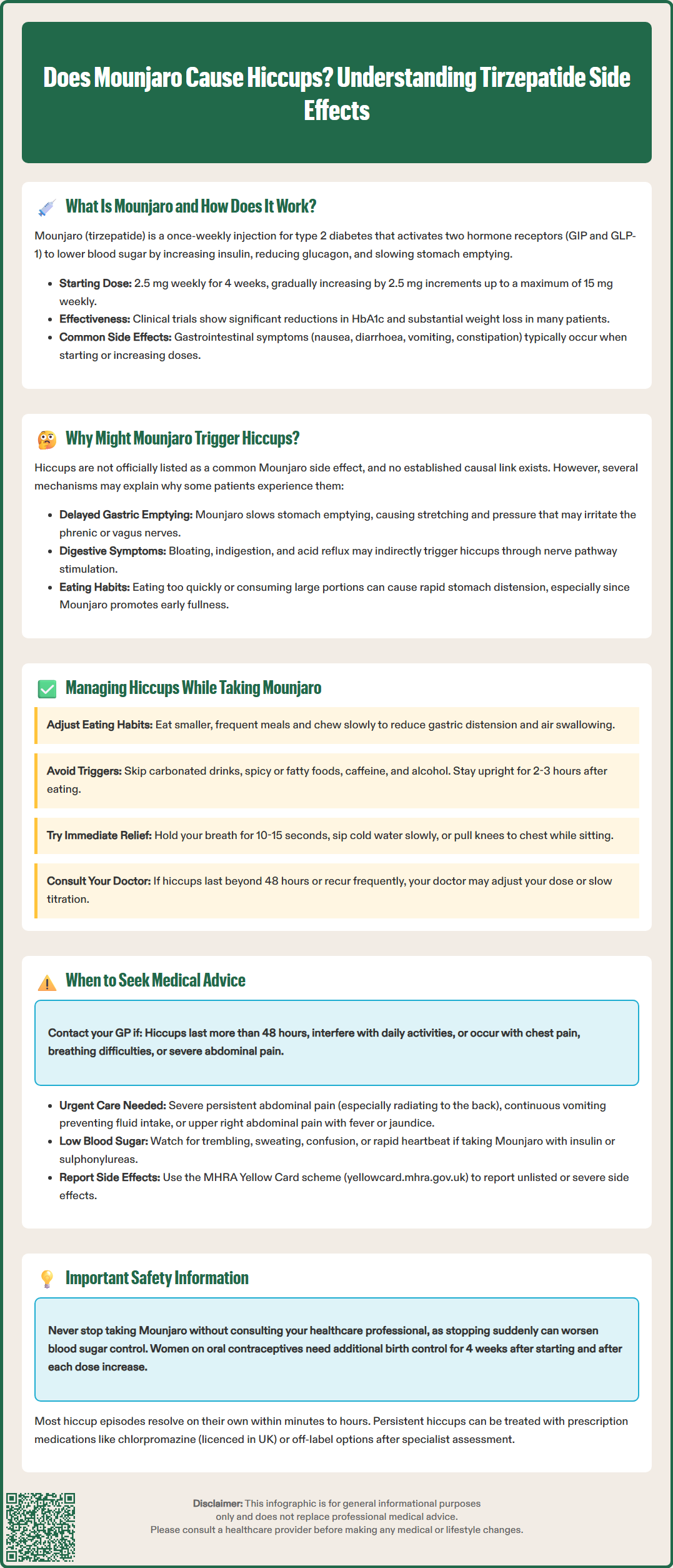
Mounjaro (tirzepatide) is a dual GIP and GLP-1 receptor agonist licensed in the UK for treating type 2 diabetes mellitus in adults. Whilst gastrointestinal side effects such as nausea and bloating are well documented, some patients report experiencing hiccups during treatment. Although hiccups are not listed amongst the most common adverse reactions in official prescribing information, there are plausible mechanisms linking Mounjaro's effects on gastric motility to this symptom. This article examines whether Mounjaro causes hiccups, explores potential underlying mechanisms, and provides practical guidance on managing this side effect whilst maintaining effective diabetes control.
Quick Answer: Hiccups are not officially listed as a common side effect of Mounjaro, but some patients report them, likely due to delayed gastric emptying and gastrointestinal distension affecting the phrenic or vagus nerves.

Mounjaro® is the most innovative GLP-1 medication proven to dramatically curb appetite, hunger, and cravings to help professional men achieve substantial weight loss.
Start Here
Wegovy® is a weekly injectable GLP-1 medication with proven effectiveness in reducing appetite, hunger, and cravings to help busy professionals lose significant weight.
Start HereMounjaro (tirzepatide) is a prescription medicine licensed in the UK for the treatment of type 2 diabetes mellitus in adults. It belongs to a novel class of medications known as dual glucose-dependent insulinotropic polypeptide (GIP) and glucagon-like peptide-1 (GLP-1) receptor agonists. Mounjaro is administered once weekly via subcutaneous injection, typically in the abdomen, thigh, or upper arm.
The medication works through a dual mechanism of action. By activating both GIP and GLP-1 receptors, tirzepatide enhances insulin secretion when blood glucose levels are elevated, whilst simultaneously suppressing glucagon release. This coordinated hormonal response helps to lower blood sugar levels. Clinical trials (SURPASS programme) have shown that this dual-receptor approach provides effective glycaemic control. Additionally, Mounjaro slows gastric emptying—the rate at which food leaves the stomach—which contributes to improved glycaemic control and promotes satiety.
Treatment typically begins with a 2.5 mg weekly dose for 4 weeks, followed by gradual 2.5 mg increments as tolerated, up to a maximum of 15 mg weekly. This gradual titration helps minimise gastrointestinal side effects.
Clinical trials have demonstrated that Mounjaro significantly reduces HbA1c levels (a measure of long-term blood glucose control) and is associated with substantial weight loss in many patients. The Medicines and Healthcare products Regulatory Agency (MHRA) approved Mounjaro in the UK in 2023, and it is now available on NHS prescription for eligible patients with type 2 diabetes who meet specific criteria outlined by the National Institute for Health and Care Excellence (NICE).
As with all medications, Mounjaro can cause side effects. The most commonly reported adverse reactions are gastrointestinal in nature, including nausea, diarrhoea, vomiting, constipation, and abdominal discomfort. These effects typically occur during dose initiation or escalation and often diminish over time as the body adjusts to the medication.
Importantly, Mounjaro is not recommended for patients with severe gastrointestinal disease, including severe gastroparesis. Women using oral hormonal contraceptives should be advised that additional contraceptive measures are recommended for 4 weeks after initiation and after each dose increase of Mounjaro.

Hiccups, medically termed singultus, are involuntary contractions of the diaphragm muscle followed by sudden closure of the vocal cords, producing the characteristic 'hic' sound. Whilst hiccups are not listed among the most common side effects of Mounjaro in the official Summary of Product Characteristics, some patients have reported experiencing them during treatment. There is no official, established causal link between Mounjaro and hiccups, but several plausible mechanisms may explain why some individuals experience this symptom.
The most likely explanation relates to Mounjaro's effect on gastric motility and delayed gastric emptying. By slowing the movement of food through the digestive system, tirzepatide can lead to gastric distension (stomach stretching) and increased pressure in the upper gastrointestinal tract. This distension may irritate the phrenic nerve, which controls the diaphragm, or the vagus nerve, which regulates various digestive functions. Irritation of these nerves is a recognised trigger for hiccups.
Additionally, the gastrointestinal side effects commonly associated with Mounjaro—such as bloating, indigestion, and acid reflux—may indirectly contribute to hiccup episodes. Gastro-oesophageal reflux, in particular, can stimulate nerve pathways that provoke diaphragmatic spasms. Some patients may also experience hiccups related to eating patterns; because Mounjaro promotes early satiety, individuals who eat too quickly or consume large portions may inadvertently trigger hiccups through rapid stomach distension.
It is worth noting that hiccups can occur for numerous reasons unrelated to medication, including dietary factors, stress, temperature changes, and underlying medical conditions. Most hiccup episodes are idiopathic (without identifiable cause) and self-limiting, typically resolving within minutes to hours. If you experience persistent or troublesome hiccups whilst taking Mounjaro, it is important to consider other potential causes and discuss them with your healthcare professional or diabetes team.
For most people, hiccups are brief and self-limiting, resolving spontaneously within minutes to hours. However, if you experience hiccups whilst taking Mounjaro, several practical strategies may help to alleviate the symptom and reduce the likelihood of recurrence.
Dietary and lifestyle modifications can be particularly effective:
Eat smaller, more frequent meals rather than large portions, as this reduces gastric distension and pressure on the diaphragm
Eat slowly and chew food thoroughly to minimise air swallowing (aerophagia), which can contribute to bloating and hiccups
Avoid carbonated beverages, which introduce gas into the digestive system and may exacerbate symptoms
Limit foods that trigger reflux, such as spicy dishes, fatty meals, caffeine, and alcohol
Remain upright after eating for at least two to three hours to facilitate digestion and reduce reflux risk
Stay well hydrated with still water throughout the day
Immediate relief techniques for active hiccup episodes include:
Holding your breath for 10–15 seconds to increase carbon dioxide levels in the blood
Sipping cold water slowly
Gently pulling your knees to your chest whilst sitting
Applying gentle pressure to your diaphragm by leaning forward
If hiccups persist beyond 48 hours (known as persistent hiccups) or recur frequently, this warrants medical review. Your GP may assess whether dose adjustment of Mounjaro is appropriate or whether additional investigation is needed. Slowing the titration schedule, pausing dose escalation, or temporarily reducing the dose may help manage gastrointestinal symptoms that could be triggering hiccups.
For intractable hiccups, chlorpromazine is licensed in the UK for this specific indication. Other medications such as baclofen, gabapentin, or metoclopramide are sometimes used off-label for persistent hiccups, though these would only be prescribed following thorough clinical assessment by a specialist.
Whilst hiccups are generally benign, certain circumstances require prompt medical attention. You should contact your GP or diabetes specialist nurse if:
Hiccups persist for more than 48 hours despite self-care measures
Hiccups are severe enough to interfere with eating, sleeping, or daily activities
You experience hiccups alongside other concerning symptoms such as chest pain, difficulty breathing, or severe abdominal pain
You develop signs of dehydration due to persistent vomiting (dry mouth, dark urine, dizziness)
More serious gastrointestinal side effects associated with Mounjaro that require urgent medical assessment include:
Severe, persistent abdominal pain, particularly if radiating to the back (potential sign of pancreatitis)
Persistent nausea and vomiting preventing adequate fluid or food intake
Signs of gallbladder problems, such as pain in the upper right abdomen, fever, or jaundice (yellowing of skin or eyes)
Symptoms of severe gastroparesis, including early satiety, bloating, and vomiting undigested food
You should also be aware of hypoglycaemia symptoms if you take Mounjaro alongside other diabetes medications, particularly insulin or sulphonylureas. Warning signs include trembling, sweating, confusion, rapid heartbeat, and hunger. If you experience recurrent hypoglycaemic episodes, contact your diabetes care team for medication review.
For severe chest pain, acute breathing difficulties, or signs of jaundice/sepsis, call 999 or go to A&E immediately.
The MHRA operates a Yellow Card scheme for reporting suspected side effects of medicines. If you experience any side effect not mentioned in the patient information leaflet, or if known side effects become severe, you can report this directly via the Yellow Card website (yellowcard.mhra.gov.uk) or app. This pharmacovigilance system helps to monitor medication safety across the UK population.
Never discontinue Mounjaro without consulting your healthcare professional, as abrupt cessation may lead to deterioration in glycaemic control. Your diabetes team can provide guidance on managing side effects whilst maintaining effective treatment of your type 2 diabetes.
Hiccups are not listed amongst the most common side effects of Mounjaro in official prescribing information, though some patients report experiencing them. The most frequently reported adverse reactions are gastrointestinal, including nausea, diarrhoea, vomiting, and abdominal discomfort.
Eating smaller, more frequent meals, chewing food slowly, avoiding carbonated beverages, and remaining upright after eating can help reduce gastric distension and minimise the likelihood of hiccups. Staying well hydrated with still water throughout the day is also beneficial.
Contact your GP or diabetes specialist nurse if hiccups persist for more than 48 hours, interfere with eating or sleeping, or occur alongside concerning symptoms such as severe abdominal pain, chest pain, or difficulty breathing. Your healthcare team may consider dose adjustment or further investigation.
All medical content on this blog is created based on reputable, evidence-based sources and reviewed regularly for accuracy and relevance. While we strive to keep content up to date with the latest research and clinical guidelines, it is intended for general informational purposes only.
DisclaimerThis content is not a substitute for professional medical advice, diagnosis, or treatment. Always consult a qualified healthcare professional with any medical questions or concerns. Use of the information is at your own risk, and we are not responsible for any consequences resulting from its use.